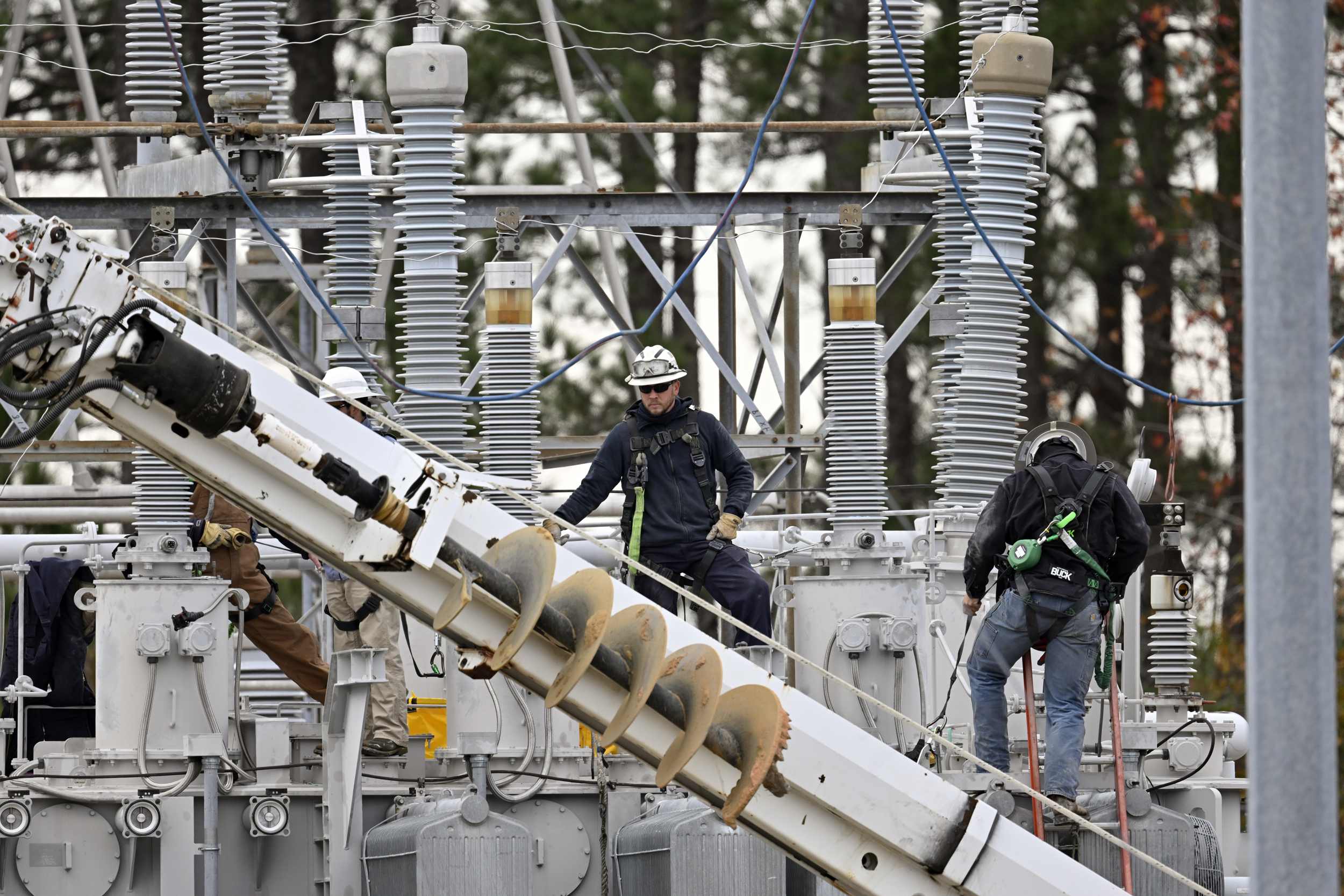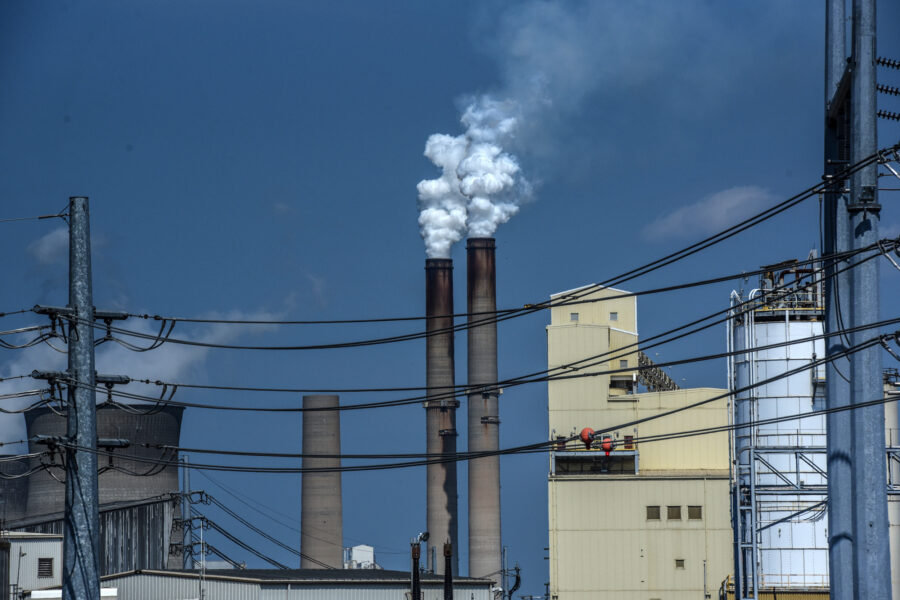Donald van der Vaart—the state’s former environment secretary and a climate skeptic who was shortlisted for EPA administrator during the first Trump administration—has been appointed to the North Carolina Utilities Commission by Republican Treasurer Brad Briner.
Van der Vaart started his career in state government as a 20-year employee in the Division of Air Quality and was promoted to secretary of the Department of Environmental Quality by Republican Gov. Pat McCrory in 2015. He was a proponent of offshore drilling and fracking.
The Utilities Commission regulates the rates and services of utilities like Duke Energy and companies that provide gas, electricity and drinking water. In that role, the commission oversees the state’s transition to renewable energy and is also responsible for ensuring the safety of natural gas pipelines.

“North Carolinians need a strong voice on the North Carolina Utilities Commission,” Briner said in a press release. “Don provides that voice, and his expertise and leadership will ensure that the citizens of North Carolina have access to low-cost, reliable energy.”
The appointment still must be approved by the state House and Senate.
Many environmental advocates oppose the appointment. Dan Crawford, director of government relations for the North Carolina League of Conservation Voters, called van der Vaart’s appointment “short sighted and a violation of the public trust. This appointment flies in the face of science and clean energy progress. It’s like letting an arsonist guard the fire station.”
Van der Vaart would earn roughly $150,000 as a utilities commissioner.
“I am deeply honored by Treasurer Briner’s confidence in me,” van der Vaart said in the press release. “I look forward to working to ensure that North Carolina’s energy future remains reliable, affordable, and ever cleaner—safeguarding both our prosperity and our environment.”
The treasurer did not have appointment power to the Utilities Commission until December, when the state legislature passed Senate Bill 382. The measure was ostensibly a disaster relief bill for communities devastated by Hurricane Helene, but also contained unrelated provisions that conservative lawmakers favored.
Then-Gov. Roy Cooper, a Democrat, vetoed the bill, but the Republican-controlled legislature overrode it.
Before SB 382, the governor appointed the majority of the Utilities Commission—three seats. After the bill became law, one of those appointments went to the state treasurer. The bill also shrunk the membership from seven to five, starting in July: two appointments by the governor, one by the state treasurer and one each to the House and Senate leadership. The treasurer and legislative leaders are all Republicans, meaning the GOP will have control of the new five-member commission.
Earlier this month Gov. Josh Stein, a Democrat elected in November, petitioned a Wake County court for a temporary restraining order to thwart the treasurer’s appointment power, arguing it violates the state Constitution. The filing names House Speaker Destin Hall and Senate President Pro Temp Phil Berger as defendants.
A spokesperson for the governor’s office told Inside Climate News that “the parties are currently trying to work out a briefing schedule to get this dispute resolved as expeditiously as possible so that the Governor can continue the work that voters elected him to do.”
When Cooper was elected governor in 2016, van der Vaart could have lost his job as a political appointee. Instead, van der Vaart used his statutory authority to demote himself to a middle management position in the Division of Air Quality.
He held that post for a year until he co-authored a lengthy opinion piece in a national environmental law journal calling for the elimination of a key air quality rule, an opinion that contradicted the stance of the agency.
Shortly after then-DEQ Secretary Michael Regan placed van der Vaart on administrative leave, he resigned.
When Donald Trump won election in 2016, van der Vaart wrote him a congratulatory letter that earned him consideration for EPA administrator. In part, the letter read: “We must put an end to the idea that more regulation is always good, and instead allow state and local experts to improve the environment.”
The top EPA post went instead to Scott Pruitt, who named van der Vaart to the EPA’s Science Advisory Board.
In a 2018 opinion piece for The Hill, van der Vaart wrote that some environmental groups were “serving as proxies for the Russians,” and to protect the environment Trump should investigate those allegations.
Van der Vaart returned to state government in 2019 when Berger, the State Senate leader, appointed him to the Environmental Management Commission. The EMC makes environmental rules that DEQ must follow.
His ascent continued when the chief justice of the state Supreme Court named him the chief administrative law judge for the Office of Administrative Hearings. The quasi-judicial agency presides over contested cases of administrative law. He has commonly assigned himself cases involving DEQ and has often ruled against the agency. If van der Vaart joins the Utilities Commission, he would resign his judgeship.
About This Story
Perhaps you noticed: This story, like all the news we publish, is free to read. That’s because Inside Climate News is a 501c3 nonprofit organization. We do not charge a subscription fee, lock our news behind a paywall, or clutter our website with ads. We make our news on climate and the environment freely available to you and anyone who wants it.
That’s not all. We also share our news for free with scores of other media organizations around the country. Many of them can’t afford to do environmental journalism of their own. We’ve built bureaus from coast to coast to report local stories, collaborate with local newsrooms and co-publish articles so that this vital work is shared as widely as possible.
Two of us launched ICN in 2007. Six years later we earned a Pulitzer Prize for National Reporting, and now we run the oldest and largest dedicated climate newsroom in the nation. We tell the story in all its complexity. We hold polluters accountable. We expose environmental injustice. We debunk misinformation. We scrutinize solutions and inspire action.
Donations from readers like you fund every aspect of what we do. If you don’t already, will you support our ongoing work, our reporting on the biggest crisis facing our planet, and help us reach even more readers in more places?
Please take a moment to make a tax-deductible donation. Every one of them makes a difference.
Thank you,













